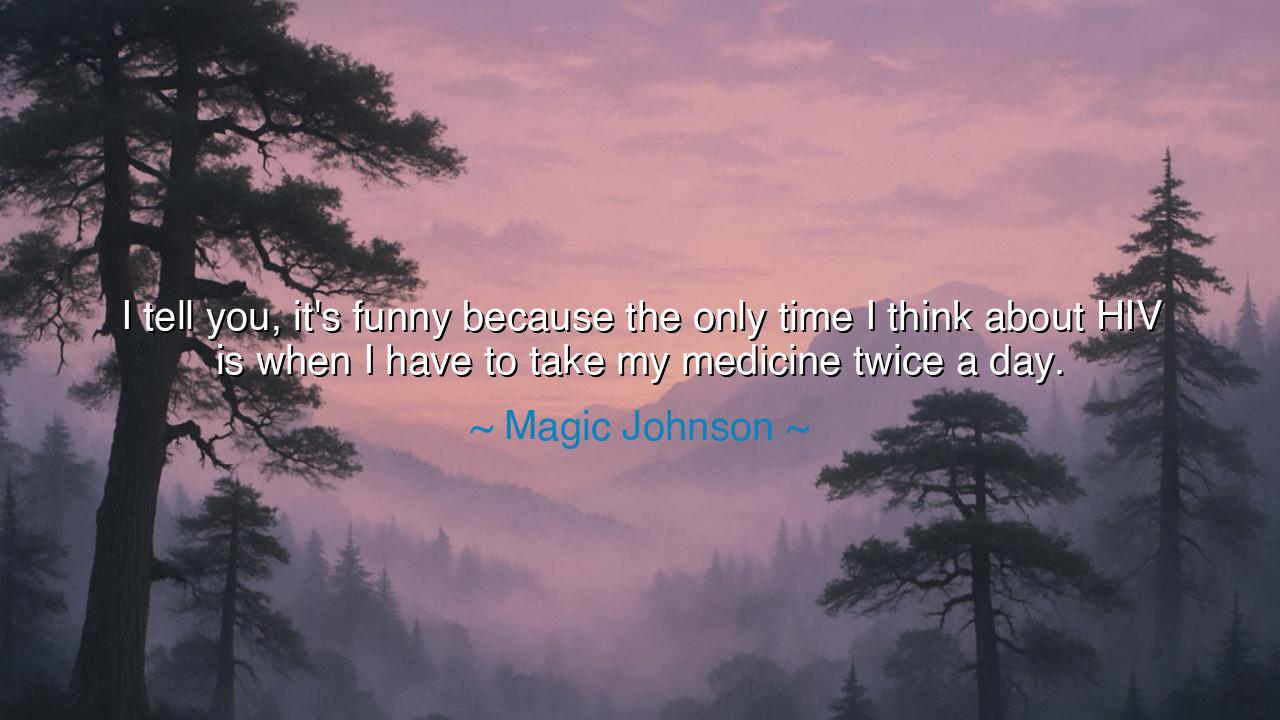
I tell you, it's funny because the only time I think about HIV is
I tell you, it's funny because the only time I think about HIV is when I have to take my medicine twice a day.






In the words of Magic Johnson, “I tell you, it’s funny because the only time I think about HIV is when I have to take my medicine twice a day.” These words, simple and unadorned, are the utterance of a man who has wrestled with fate and emerged not bitter, but victorious in spirit. Beneath their calm humor lies a profound truth about acceptance, strength, and the power of life over fear. Magic speaks not as a man who denies his struggle, but as one who has transcended it — who has learned to live so fully that the shadow of his illness has become but a passing thought. His words are a hymn to endurance, to peace earned through courage.
When Earvin “Magic” Johnson announced in 1991 that he was HIV-positive, the world trembled. At that time, HIV was seen not merely as an illness, but as a sentence — a death unspoken, surrounded by fear and ignorance. Yet Magic stood before the world with the same grace and poise that had carried him across the basketball court. He smiled, not in denial, but in defiance of despair. Through his light, he changed the very conversation around the disease. He showed the world that HIV was not the end of life, but the beginning of a new way of living — with discipline, gratitude, and purpose. And so, when he now says that he barely thinks of it, we see not arrogance, but mastery — the quiet victory of the human soul over the trials of the body.
The ancients spoke often of the warrior who learns to live with his wounds. Achilles was told that glory would come with suffering, and that no man could escape his destined pain. Yet the true hero is not the one who escapes affliction, but the one who carries it lightly. So too with Magic Johnson: he carries his illness as a warrior bears his scar — not as a mark of weakness, but as a symbol of survival. By speaking of HIV with humor, he strips it of its power to terrify. Laughter, in this sense, becomes an act of rebellion. It is the soul’s refusal to be defined by fear.
And in truth, there is a sacred irony in his words — for the very medicine that reminds him of his illness is also what sustains his life. Each pill, each dose, is both a reminder of mortality and a promise of tomorrow. To think of HIV only when taking medicine is to have found peace with what once brought terror. This is the heart of acceptance — when the mind no longer struggles against the inevitable, but instead learns to live within it gracefully. The wise of old would call this the art of equanimity: to live in harmony with fate, neither resisting nor surrendering, but moving forward with balance.
Yet Magic’s quote is not only about disease; it is a reflection on the human condition. Every person bears some invisible burden — grief, fear, regret, or pain. Some carry illness, others loneliness. But as Magic shows us, the secret is not to be consumed by it. He teaches us that we may acknowledge our trials without letting them become our identity. The disease may live in his body, but his spirit belongs to joy. This is the power of perspective — the realization that suffering loses its grip when we cease to feed it with attention.
Consider also the story of Helen Keller, who was struck blind and deaf as a child, yet declared that “life is either a daring adventure or nothing at all.” Like Magic, she refused to let limitation define her. Through patience and love, she found meaning where others would have found despair. Both souls remind us that the measure of a life is not its ease, but its resilience — the courage to see beauty despite hardship, to live fully despite constraint.
Thus, the lesson in Magic Johnson’s words is this: do not let the darkness of your challenges eclipse the light of your life. Whatever your burden — illness, failure, heartbreak — do not dwell in it. Acknowledge it, tend to it, but do not worship it. Take your “medicine,” whatever that may be, and then return to living. For life is not meant to be spent in mourning the difficult, but in celebrating the possible. To think of pain only when necessity demands is the art of liberation.
Practical teaching: Each day, remember that your trials are not your identity. When your mind turns to what burdens you, treat it with grace, not fear. Do what is needed — take your medicine, face your challenge — and then turn your gaze back to the beauty of living. Laugh when you can. Be grateful when you wake. Help others to carry their weight. In time, you too may reach the point where, like Magic, you think of your hardship only for a moment — and spend the rest of your days simply, gloriously alive.






AAdministratorAdministrator
Welcome, honored guests. Please leave a comment, we will respond soon